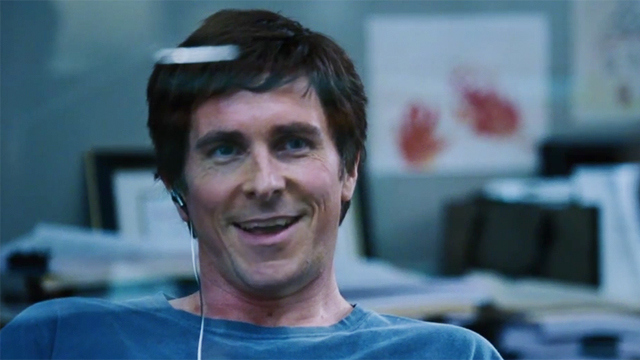A comedy about the financial crash? Not many laughs in that I bet you’re thinking. But in the hands of Anchorman director Adam McKay this adaptation of The Big Short: Inside the Doomsday Machine (by Moneyball writer Michael Lewis) charts the origins of the 2007 money market meltdown and defies storytelling conventions. So, prepare for a return on your investment in its twists and turns with an unexpected laughter premium.
We follow the fortunes of four moneymen (played by Steve Carell, Christian Bale, Brad Pitt and Ryan Gosling) who develop the then crackpot notion that the portentously monikered sub-prime mortgage market will crash. They hatch plans to bet against decades of stability and short the market. For an audience it’s a bit like watching Titanic – we know this ship is going down but morbid fascination compels us to watch events unravel. McKay’s kinetically edited film switches focus at breakneck speed as we learn that confusion was, and still is, the name of the game. Amidst the swirling talk of credit default swaps and synthetic collateralized debt obligations (yeah, us too) the fourth wall is broken by Gosling’s banker Jared Venett. Wearing a suit that would have been at home in Oliver Stone’s Wall Street the wannabe master of the universe leans in to camera and archly states: ‘You feel stupid right now. You don’t understand what’s going on. Well that’s what the banks want you to feel!’
Pitt’s retired investment guru Ben Rickert provides the film’s moral core but it’s Bale’s Oscar-nominated turn as the hedge fund analyst who first predicted the chaos that proves inspired. Dr. Michael Burry, diagnosed with Aspergers and seen in the film alternating between running a billion dollar fund and thrashing his drum kit wearing shorts and flip flops, saw the patterns of chaos emerging before anyone else. Bale appears lost in a fugue state as Burry, a man consumed by his chaos theory fuelling the mania of this financial prophet of doom.
Meanwhile, Mark Baum (played by Carell and based on real life banker Steve Eisman) and his team remain sceptical of the impending crash. But when the penny drops Baum struggles with the moral dilemma that his company is set to make a fortune as millions lose their homes. It’s a nuanced and tortured characterisation from Carell further highlighting his talents as a dramatic actor and light years away from Brick Tamland. But the average person probably has as much grasp of financial chicanery as Brick. So, inspired by his skits for Funny or Die, McKay teams Selena Gomez with esteemed behavioural economics professor Richard Thaler at a roulette table to explain the monetary mumbo jumbo, while in another neat cameo Margot Robbie delivers the skinny on sub-prime while sipping champagne in a bubble bath.
The Big Short compounds what we already know in chilling fashion – boom and bust is now the norm. McKay manages to avoid sermonising and tell a difficult story invested with humour but still rippling with moral shock and outrage at the power banks wield. The banks they said were too big to fail. It’s like Wall Street with jokes but almost a decade later we’re all still feeling the sting of the punchline. And with the world’s money market facing new turmoil The Big Short is a film for our times, a sugarcoated warning if you will.
Carell told HeyUGuys that during research for his role Eisman spoke of his frustration that nothing in the banking industry had really changed since the crash. The film closes with the chilling reminder that no reforms were put in place and only one person was ever jailed. Now there’s a joke with a dark message.









